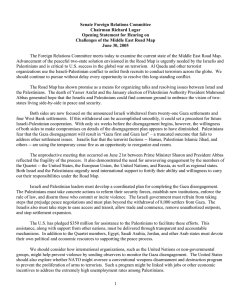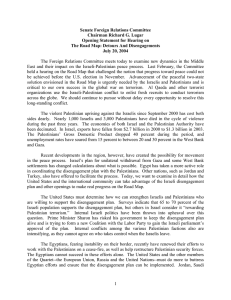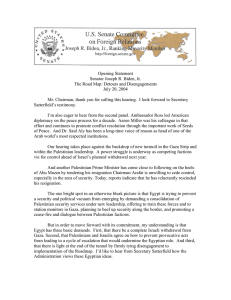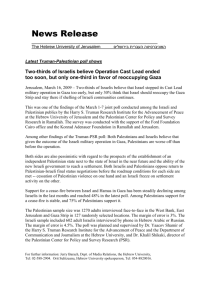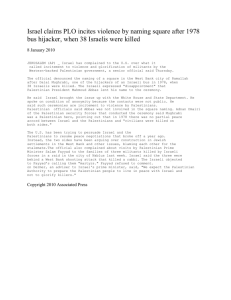Testimony of James D. Wolfensohn Quartet Special Envoy for Disengagement
advertisement
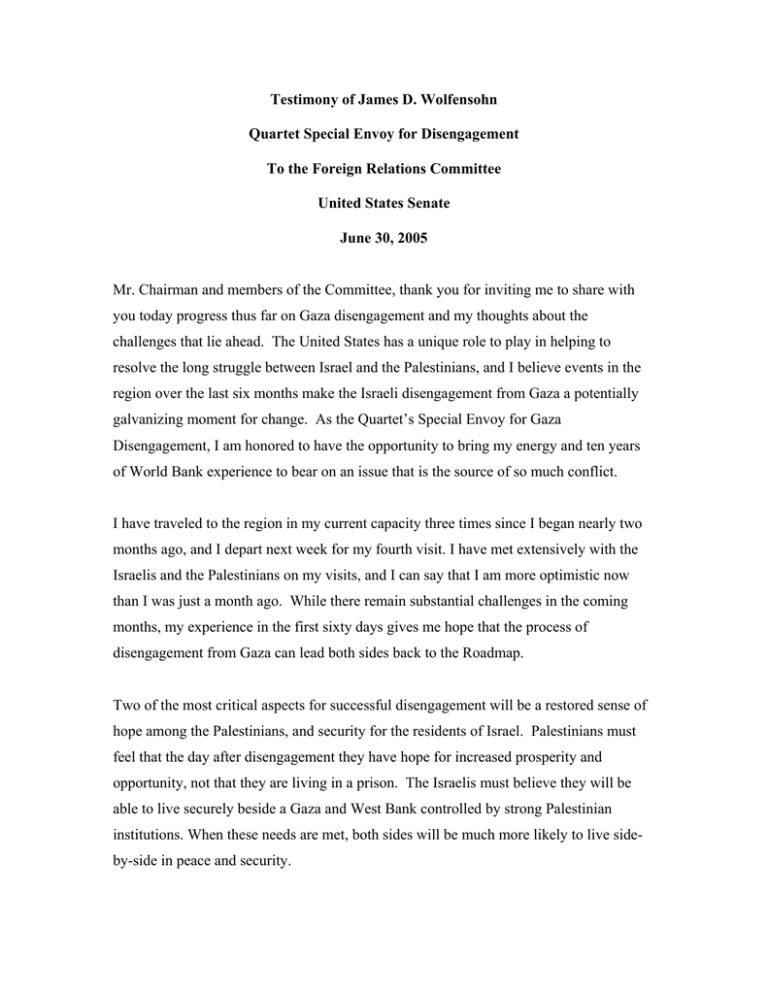
Testimony of James D. Wolfensohn Quartet Special Envoy for Disengagement To the Foreign Relations Committee United States Senate June 30, 2005 Mr. Chairman and members of the Committee, thank you for inviting me to share with you today progress thus far on Gaza disengagement and my thoughts about the challenges that lie ahead. The United States has a unique role to play in helping to resolve the long struggle between Israel and the Palestinians, and I believe events in the region over the last six months make the Israeli disengagement from Gaza a potentially galvanizing moment for change. As the Quartet’s Special Envoy for Gaza Disengagement, I am honored to have the opportunity to bring my energy and ten years of World Bank experience to bear on an issue that is the source of so much conflict. I have traveled to the region in my current capacity three times since I began nearly two months ago, and I depart next week for my fourth visit. I have met extensively with the Israelis and the Palestinians on my visits, and I can say that I am more optimistic now than I was just a month ago. While there remain substantial challenges in the coming months, my experience in the first sixty days gives me hope that the process of disengagement from Gaza can lead both sides back to the Roadmap. Two of the most critical aspects for successful disengagement will be a restored sense of hope among the Palestinians, and security for the residents of Israel. Palestinians must feel that the day after disengagement they have hope for increased prosperity and opportunity, not that they are living in a prison. The Israelis must believe they will be able to live securely beside a Gaza and West Bank controlled by strong Palestinian institutions. When these needs are met, both sides will be much more likely to live sideby-side in peace and security. Throughout the first weeks of meeting with the parties in my new capacity, I have been struck by just how well the two sides have gotten to know each other over the years. Senior Israeli and Palestinian officials have worked together for more than a decade and personal friendships have developed. But rather than create an atmosphere of trust that has moved the two sides forward toward peace, there has instead come to exist a kind of uneasy chess game, where both sides have learned exactly the moves that each will make. The atmosphere surrounding the parties is heavy with mistrust I saw it as my first task to find a way to break this unproductive and potentially endless cycle. Much of the debate on disengagement between the parties since the Palestinian elections has centered on trying to agree the terms of the agenda that would form the basis for discussions. The resultant discord and disagreement over the agenda (from Palestinian insistence on inclusions of “Safe Passage” and other Oslo accord issues, to Israeli refusal to even raise the possibility of reopening the Gaza airport) had stymied progress on any real issues. Fortunately this has now changed, and real negotiations have begun. To bring the sides together, I proposed a set of six key issues the parties must address together urgently for disengagement to work. There are an additional three items the Palestinians must accomplish on their own, with international support, if the day after disengagement is to bring hope for the Palestinians and not despair. After many hours of discussions over the last three weeks, I am extremely pleased to report the two sides have now agreed to this agenda, and have already begun substantive discussions. Six Joint Issues There are many individual items which will require the continued attention of both sides for disengagement to be an economic success for the Palestinians and assure Israeli security. Of these, the following six will “make or break” the process: (1) Border Crossings and Trade Corridors: Smoothly functioning border points between Gaza and Israel, and in the south at Rafah with Egypt, and shipping methods that make trade profitable for the Palestinians, will be a clear and immediate indication that life is better after disengagement. With the proper application of technology and adoption of good border management principles, the Palestinians can prosper and reap the benefits of free flowing trade.. The Quartet team is working to provide assistance to both sides on materials handling, scanner technology, customs management and other essential issues. Both sides will also need to seriously address allegations of corruption at the crossings. The parties met Sunday, June 26 to discuss these issues, and have visited several locations together. I am hopeful that there will soon be agreement on some difficult issues, including the location of disputed crossings and the type of shipping methods that will be used. There is an additional important and difficult issue on the Customs Envelope in relation to the border with Egypt. (2) Connecting Gaza with the West Bank: Free movement of goods and people between Gaza and the West Bank is essential to revitalization of the Palestinian economy. At present, the parties are discussing first the use of convoys to move goods and people, to possibly be followed by construction of a sunken road and eventually a rail link. The World Bank is currently working with USAID, other donors and the parties to provide technical advice. (3) Movement in the West Bank: The system of closures and movement restrictions in the West Bank, introduced for security reasons, is disruptive to Palestinian economic recovery, and, as currently structured, may not be optimal for Israeli security. The parties have at this stage agreed to work to review each of the barriers and security measures to determine how the situation can be further eased. (4) Air and Sea Ports: Both a land and a sea port are needed to give Gaza and the West Bank direct access to third countries. There has been a great deal of movement on these issues since I arrived. The Israelis agree that reconstruction of the Gaza airport could start after a peaceful disengagement, and that work should immediately begin on the construction of a seaport. In each case the issue of security is the subject for further discussion and agreement, but I am satisfied that several alternatives seem possible. (5) The Houses in the Settlements: The existing settlement houses in Gaza do not meet the Palestinians’ needs for more open land and higher density housing. At the same time the Israelis are reluctant to leave the structures intact. The parties have tentatively agreed the houses should be destroyed, and are working out the best mechanism to do so. I am hopeful a solution can be found that generates jobs for the Palestinians -- whether through removal and processing the rubble, or actually dismantling the houses -- as well as creates a reusable resource in the form of processed rubble or salvaged construction materials. Technical issues remain as well as the need for agreement as to where this rubble will be placed. I want to stress that removal of the houses makes the most sense for both sides, for economic and political reasons. I understand this may seem somewhat counterintuitive to outside observers, but the reality on the ground is that the Palestinians will be best served by a land development strategy of their own design, tailored to meet their specific needs. I hope the details of the overall arrangement to address this issue can be concluded in the coming days. (6) The Greenhouses in the Settlements: Unlike the settler houses, the agricultural assets settlers could leave behind may have value for the Palestinians. From my discussions it is apparent that the settlers are willing to leave the greenhouses, as well as the equipment needed to operate them, if they are provided adequate compensation. The Government of Israel and the settlers are discussing this issue. The Palestinian Authority is unwilling to pay the settlers. It remains for the Israelis to decide whether additional compensation should be paid and how such payment can be funded. I believe the Government of Israel is coming to understand they will need to make this compensation without donor assistance, and that it is a mutually beneficial way to proceed. Changing the Dynamic: Three Palestinian Issues The Palestinian government has the ultimate responsibility for creating hope for its people and the conditions under which they can prosper. Only by seriously undertaking key reforms, and continuing to build institutions that can better serve its people, will the Palestinian Authority (PA) strengthen its legitimacy. If the PA takes these steps, the process of disengagement can serve to reinvigorate the Road Map. In order for the PA to be successful in its efforts, the Palestinian people must believe their future holds promise -- for economic prosperity, dignity and a return to normalcy. The Israeli people must believe that they are secure, which will then allow for freedom within the territories and the ability to move and to trade with Israel and the outside world. An essential part of providing these conditions will be for the international community to strongly register its support for the short-term resources the PA will need simply to make it through the end of 2005, as well as the medium- and longer-term support they will need to generate an economic transformation. I recognize the idea of helping the Palestinians transform their future is not new. But I believe we, as an international community, are currently at a moment when a relatively small amount of support could have a transformative impact. There are three key areas covering the short and medium terms, where donors can support Palestinian reform that will have the greatest impact and be most likely to foster hope for a new future. (1) The Palestinian Authority’s Fiscal Crisis and a new Social Safety Net: The PA faces a major recurrent budgetary shortfall for 2005 that must be met through international support. In order to receive this assistance, the PA needs to maintain tight wage discipline in accordance with the existing Wage Bill Containment Plan, reform the public sector pension system and develop a comprehensive Social Safety Net Program that is fiscally sustainable over time. Moving forward, the PA needs to develop a Fiscal Stabilization Plan for the 2006-2008 period. To ensure fiscal solvency for the PA for the remainder of 2005, international donors, including Arab countries, should make good on all pledges of support. This will allow the PA to manage its current short-term crisis and focus attention on undertaking reforms. (2) A Stable Medium-Term Financial Plan for Palestinian Development: Over the medium term, the PA should create a broad development plan that is linked to a fiscally sound financial plan. This leaves donors with the choice of funding piecemeal programs, or financing a hand-to-mouth operation. I propose that the PA, with the help of the international community, engage in a fully participatory process of developing a consolidated plan, which donors can then approach in a coordinated and comprehensive way. Support for this plan from the international community, including the Arab countries, must be substantial if the existing dynamic is to be changed. Both sides should receive a clear message that donors stand united in their willingness to use this opportunity to work toward a lasting solution. This support should of course be contingent on Palestinian reforms and on security for Israel. I have met separately with many of the G8 leaders, and will meet in a few days with them together in Gleneagles to solicit their strong endorsement of this approach. (3) A Package of Quick-Impact Economic Programs: Disengagement needs to be accompanied by an immediate, demonstrable change in living conditions if it is to resonate with the Palestinian people. A sharp increase in job opportunities would provide this sense of change and hope. Unemployment in the West Bank and Gaza remains dangerously high, particularly among Palestinian youth. In the short term, jobs can be created by a concerted program of labor-intensive infrastructure and agriculture rehabilitation, urban upgrading and housing construction. Donors and the PA should meet without delay to develop such a program, for which pledged donor funds already exist and should be rapidly mobilized. Equally important is Palestinian access to work in Israel. If the average daily number of permitted workers crossing into Israel can be raised and consistently maintained at a higher level, this would have a significant stabilizing effect on the Palestinian economy. The United States Congress will be instrumental in helping the Quartet make the plans I have described here a reality. I welcome the opportunity to work with you, because I know I cannot succeed without your help. I look forward to a fruitful partnership that could bring real change to this long struggle.

